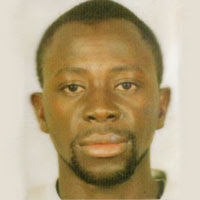“I am very happy that the Jammeh government has
come back on its senses”
Mafugi Ceesay
I am very happy that the Jammeh government has come back to its senses
to give this very important and historic (independence) day the respect and
dignity it deserve, Omar Jallow told The Voice on Wednesday.
The comments by the leader of the People Progressive Party (PPP)
followed the current government’s decision to centralize and magnify
celebrations marking The Gambia’s 48th Independence for the first
time in recent years.
Mr Jallow, fondly known as O.J. applauds president Jammeh for honoring
the day, for which people like President Sir Dawda Kairaba Jawara, Francis
Edward Small, Pierre S. Njie, Jane Colley Faye and others played a critical
part in the historic struggle to free The Gambia from colonialism.
No down play
On this day, I am not only commending political leaders but the
followers too. In every given situation particularly in fight for freedom, not
only the leaders are important but also the followers, he told The Voice on
Feb. 20, 2013 at his residence in Serrekunda.
He said it was not easy for the Gambia to gain its dignity and freedom
on Feb. 18, 1965; hence, nobody should come and try to down play that freedom.
“For me, it’s a very historic incident but I am happy that the ruling
APRC-government has realized their mistakes and have come back to give this day
the life it deserve,” the former agriculture minister of the deposed
PPP-government said.
O.J. was among young Gambians who took part in a parade at the
McCarthy Square (now July 22 Square) when the country had its independence in
1965 - to see the British Union Jack flag lowered and the
red-white-blue-white-green flag of The Gambia hoisted for the first time ever.
Cannot survive
Gambians should be proud of this day and the peaceful manner in which
we have conducted ourselves up to date, O.J. said. Gambians should also
remember that the founders of the country’s independence were steadfast and
committed to making the country a strong and viable independent state.
“This is why when the British thought that Gambia cannot survive on
its own and should instead become part of Senegal, Sir Dawda rejected that
idea.
“The PPP championed the struggle for ‘total independence’ at a time
when some people within the Party had the believed The Gambia cannot stand on
its own,” he explained.
According to him, the issue led to the resignation of the PPP
president Sanjally Bojang, who joined the United Party that wanted The Gambia
to be part of Senegal.
The Gambia became independent and a sovereign state on the commitment,
steadfastness and strong will of the leaders of the PPP, he said.
Multiparty democracy
O.J. said when the Gambia had its independence in 1965, it was one of
the few, if not the only country within Africa that encouraged, sustained, and
maintained a multiparty democracy.
All other countries were either a one party state or a dictatorship,
he said.
“Sir Dawda as leader believed it will be a contradiction for The
Gambia to fight for its liberty and continue the inhumane
slavery-and-colonial-type policies used against the Africans by the British.
“This was the reason Sir Dawda believed in democracy, respect for rule
of law, and respect for human rights.
“During a meeting in Kampala, Uganda, The Gambia championed the need
for the establishment of a human and peoples’ rights commission for Africa,” he
said.
Dysfunctional institutions
The PPP perpetuated itself in power for nearly 30 years and won almost
every election held between 1965 and 1994, but O.J. said for the 29 years Sir
Dawda led The Gambia, the country have held free, fair and transparent
elections.
After the military takeover in 1994, The Gambia has seen the
dysfunction of all those institutions that were upholding democracy, rule of
law and human rights of the country, O.J. argues.

Comments
Post a Comment